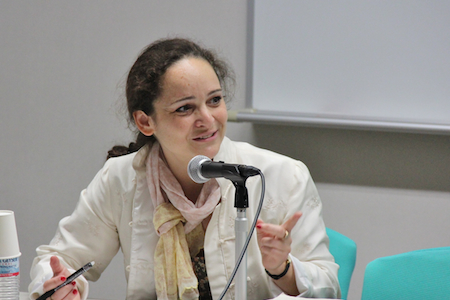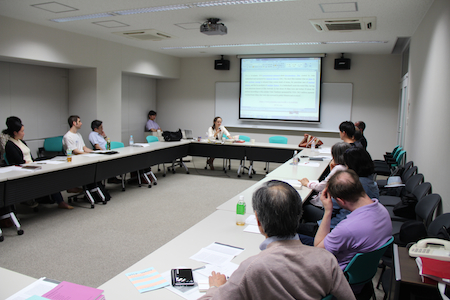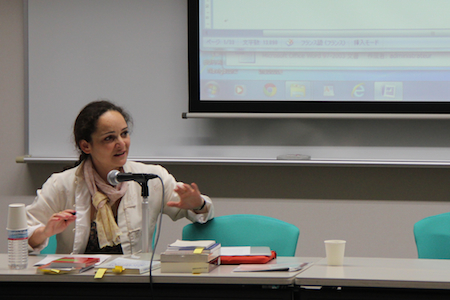[Report] Presentation by Elise Domenach: "Denial and recognition in films on 3.11"
On June 2nd, Elise Domenach gave a presentation entitled "Denial and recognition in films on 3.11", focusing on several recent documentaries concerning the disaster in Tohoku.
More broadly, Dr. Domenach's research has explored the project of the philosopher Stanley Cavell, especially his concern with the power of cinema to bring its audience into contact with "ordinary skepticism". Her presentation this evening juxtaposes this inquiry with a more recent project to consider post-3.11 films.

In this presentation, Domenach's theoretical point of departure is the problem of how skepticism is expressed through film. In light of Cavell's argument, we may understand cinema as the privileged art for both expressing and domesticating a certain experience of skepticism vis-à-vis "the world". That is, bringing us into a more profound contact with the nexus of doubts about our relationship with the world and, as it were, providing a space within which we can recover from these doubts. Extending this line of argument, Domenach proposes that we may consider the documentaries on the 3.11 disaster as examples of this experience.
As Domenach points out, this immediately raises several important questions. First, there is a question of the relationship between these films and the "event" of 3.11, and the sense in which film plays a role in defining or constructing the event. We might ask, for example: what are the contours of this event-defining power of documentary cinema and, similarly, what are the limits of the corpus of films concerned with 3.11? Can we, accordingly, consider films that were produced outside of Japan (e.g., those of Philippe Rouy) as having played a similar role in defining our understanding of 3.11?

A second question concerns how films have shaped our understanding of recent history, of 3.11 and the period that follows. Generally, this has been organized under the concept of "catastrophe", or a period of catastrophe. The temporal logic of this history is uncertain and open ended. Here, Domenach recalls two different senses of "catastrophe" in relation to 3.11: first, the sense of a catastrophe of visibility, in that we are suddenly concerned with something that cannot be represented or rendered visible (radiation), and the way in which this abets certain forms of denial about 3.11; and second, the sense of catastrophe as a visible landscape, insofar as what we describe as "catastrophe" has been, first and foremost, the destruction of an entire landscape.
Another side to these questions concerns our relationship with nuclear catastrophe as it has been defined through our historical encounter with nuclear war. Domenach asks: to what extent is our understanding of the 3.11 catastrophe mediated by our imagination of nuclear war, or by our collective denial, or repression of fears about nuclear war? Here, we may point to the ways in which popular cinema — especially Hollywood cinema — has repeatedly thematized nuclear destruction, and the ways in which these images of destruction or an end of human civilization have fascinated mass audiences. This fascination is evoked in the opening sequence of Fujiwara Toshi's No Man's Zone, though of course Fujiwara's intention is to foreclose this as a possibility for his audience.

Here, Domenach invokes Cavell's reflections on the collective fascination with nuclear war (and, by extension, our fascination with images of it), as an expression of despair. Cavell describes this in his meditation on the tradition of American Transcedentalist thought (Emerson and Thoreau), but also in relation to Beckett's Endgame and Kubrick's Dr. Strangelove. On this account, the end-time theology that has animated the American encounter with images of nuclear destruction may be understood as a form of despair. There is, in this, a kind of "world destroying" impulse. Domenach proposes that we might consider Cavell's formulation in relation to representations of the 3.11 disaster, not as instances of this mode of seeing the world, but rather as critical views on it. This view is, as Cavell would describe it, "a refusal of the imagination of nuclear war", which is equally a refusal of a certain logic of viewing catastrophe. Following Kant's meditation in Das Ende aller Dinge, Cavell points out that a such view on the end of the world — e.g., as that provided endlessly through images of catastrophe in popular cinema — is strictly speaking an impossible vantage point (i.e., from which standpoint could we view the end?). Domenach suggests that this, precisely, offers a structure of denial to spectators.
Nevertheless, what is noteworthy in the documentaries on 3.11, is the extent to which they also refuse this "imagination of disaster" or structure of denial. For Domenach, the means by which recent documentary cinema seeks to express this refusal is a subject of ongoing research.
— M. Downing Roberts, UTCP






